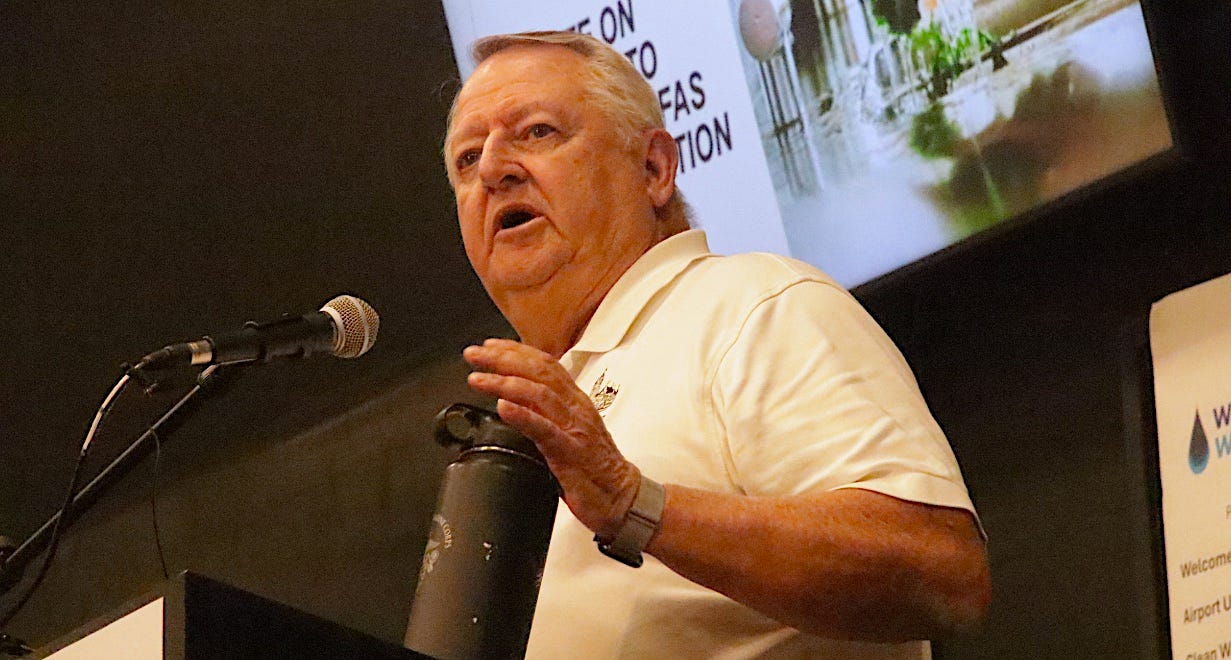Thursday's postcard, and a push for action and accountability from Al French's latest challenger
June 13, 2024
Avalanche lillies and paintbrush, Mount Rainier National Park
A gathering at the courthouse
Molly Marshall brought two rings of supporters to the Spokane County Courthouse Wednesday.
The first formed a loose semi-circle behind her, shortly after 1 o’clock, as she prepared to give her opening remarks to a few dozen supporters and reporters who’d gathered in the shade of the courthouse’s east lawn.
These were men and women who have either been victimized or otherwise touched by the contamination of West Plains drinking water with PFAS—per-and polyfluoroalkyl substances—a large suite of synthetic molecules in which flourine replaces hydrogen in chain-like bonds with carbon. For their resilience in nature PFAS are known as “forever chemicals.”
Molly Marshall backed by supporters at yesterday’s media event to address the West Plains PFAS controversy
PFAS is still emerging as a formidable, national public health problem, largely due to its solubility in water and widespread presence (at levels exceeding the U.S. EPA’s new, drinking water standards) in hundreds of drinking water systems nationwide. In Spokane County the hopeful leans against the dreadful:
•While the City of Spokane’s most recent tests of its seven domestic water wells found samples from two wells slightly above the new EPA standard of 4 parts per trillion, its actually good news considering the breadth of the PFAS problem, the importance of the sole-source aquifer to the urban areas that depend on it, and the built-in options the City has to reduce the PFAS levels. (See the KREM-2 video report below, featuring EWU professor Chad Pritchard)
•The story is much different, and much more dire, just to the west of Spokane where most of the county’s Fifth County Commissioner district is situated above a dramatically different aquifer system—in layers of 15 million year-old basalt rather than the deep bed of cobbles that whisks groundwater from the Idaho mountains into the City of Spokane’s aquifer. It’s here that groundwater has been contaminated (at levels reaching hundreds of times higher than the state and federal actions levels) due to PFAS in aviation fire fighting foam used at two of the state’s largest airports—Spokane International Airport (SIA) and Fairchild Air Force Base FAFB) just three miles to the west of SIA.
The Fifth Commissioner district is the political turf for Al French, the Spokane-area’s longest serving and arguably most influential politician. He is up re-election this year, and Molly Marshall will be his opponent. French is a Republican; Marshall a Democrat.
Marshall is a retired lieutenant colonel who, at the peak of her 30 year military career piloted KC-135 tankers based at FAFB. She has served overseas in support of military aviation operations in the Persian Gulf. In recent years she has been neighborhood activist in the Grandview/Thorpe neighborhood wedged between the Latah Valley to the northeast and SIA to the northwest.
The immediate threat in the district this week was a wildfire that broke out just to the south of the airport on Tuesday and Marshall began her opening remarks with a report on the damage and thanking the firefighters who brought it under control. But, as advertised, she was there to focus PFAS: to sharply criticize French not just for his slow response to the crisis, but also referenced the unsettling evidence (from interviews and emails obtained via public records requests) that the influential commissioner and long-time SIA board member acted on more than one occasion to delay a key groundwater study—one just now underway—aimed at getting a much needed analysis of how high concentrations of PFAS (many between 10 and 100 times the new actions levels) are spreading beneath the West Plains and reaching private wells miles from the sources. She also criticized SIA officials, along with French and other the airpor board members for not acting, just in recent months, to apply for a state matching grant that would have provided vital funds to the airport to help pay for a PFAS cleanup action under the Washington’s toxics cleanup law.
Full coverage of the West Plains PFAS investigation is available at Rhubarb Salon, as a public service. Please consider supporting The Daily Rhubarb with a paid subscription at the link below—tjc
“During this time,” she told the crowd, “Commissioner Al French held positions on the Spokane Airport Board and the [Spokane} Regional Health District.”
Incumbent Fifth District Commissioner Al French, fielding hard questions from Craig Volosing on the West Plains PFAS cover-up, earlier this month
As I reported on May 5th, the question about the state grant was put to French during a meeting on the West Plains on April 11th. French indicated that because it was a matching grant, SIA would have to contribute some of its own funds to the cleanup which, he indicated, would risk sanctions from the Federal Aviation Administration. But as the Spokesman-Review later reported, a high level FAA official had actually encouraged the airport to cooperate with the state’s cleanup effort in a March 29th letter addressed to the SIA’s attorney.
The SIA leadership—most notably Airport CEO Larry Krauter—have been conspicuously absent from public meetings on the West Plains where state, county, and Air Force officials listen and try to respond to public comments. Yet, French actually has been showing up this spring and summer at public events dealing in whole or in part with the PFAS firestorm—two of which he convened with other county officers. At those events he has faced stiff criticism and questions.
Most recently he attended a program hosted by the West Plains Water Coalition in early June where he was grilled by Craig Volosing, the president of the Friends of Palisades. Volosing lives in the Palisades area just north of SIA and has been engaged in the PFAS issue for several years. He is highly critical of French and lit into him about what Volosing plainly sees as French’s track record of obstruction on the issue.
As I reported on June 4th, French’s odd response was that he was working with county and airport staff to gather documents that might refresh his memory about what he and others had done on the issue in the years before the contamination at SIA came to light last summer. He said he planned to make that information public later this month and told Volosing that it would refute the criticism French was now facing. Yet, he also mentioned, in response to Volosing questioning, that there are “legal reasons for that [not releasing some pertinent records] that I cannot speak to at this point. And I'm working to try and get the freedom to be able to talk about those.”
At her gathering, yesterday, Marshall offered a five point action plan that:
•Proposes using eligible Federal Rescue Act Funds to create a county-wide PFAS victims fund.
•Would push the County’s attorneys to join class action lawsuits against PFAS manufacturers.
•Would encourage the Spokane Regional Health District to enhance its public health response expertise in light of the recent retirement of Mike LaScuola, a prominent SRHD health worker who was instrumental in trying to expedite the response to the West Plains PFAS contamination.
•Would create a County Task Force to help secure state and federal funds for the PFAS cleanup on the West Plains.
•Promises a personal commitment to apply for and manage state and federal grants that could help fund PFAS remediation efforts on the West Plains.
Marshall also made an appeal to the media to ramp up their investigation of the allegations of negligence and inaction on the part local officials who may have obstructed and thus delayed the response to the PFAS contamination from SIA.
At the conclusion of her presentation I asked Marshall if she would support an independent investigation to probe unanswered questions about who knew about PFAS contamination at SIA, when they knew it, and why SIA officials didn’t take actions at the time to protect neighboring groundwater users. She said she would.
My report would be incomplete if I didn’t mention a bizarre episode that marred the event.
Marshall was only 5 minutes into her prepared statement when a young man holding a cell phone, apparently using it as a recorder, waded to toward the front of the crowd and began yelling questions at her.
“Do you regret being endorsed by candidates and elected officials who support de-funding the police,” he shouted, followed instantly with “Are you going to raise our taxes?”
Marshall stopped and tried to be heard above his interruptions, saying she would answer questions when she was finished. But the young man, wearing a white t-shirt and blue jeans, yelled over her voice, repeating his question about de-funding the police and then, without pause, asking why she didn’t want to answer his questions.
In short, it became quite a scene.
“Your behavior is extremely disrespectful to the people standing with me,” Marshall protested. “I would ask that you just take a step to the back.”
He did not. A crowd of Marshall’s supporters, some irate, and some trying to reason with the him, surrounded the shouter, one physically ramming him with his chest before others intervened to try prevent a brawl. A brawl was averted but it took a second ring of Marshall supporters—about as large as the ring that had her back—to try to protect her voice as she continued to try to speak. They stood tightly together as a human wall and slid side-to-side like basketball players in a zone defense, all the while forcing the young man further from the candidate. It became a scrum with the young man yelling questions and demanding not to be touched. It went on for at least ten minutes before a security guard arrived to restore order.
The young man was still interacting with members of the crowd as I was leaving so I went over to him and asked whether he was a journalist. He said he didn’t have to answer my question. I asked his name. He asked mine.
“Tim Connor,” I told. “What’s yours?”
He said he didn’t have to answer that either.
—tjc










